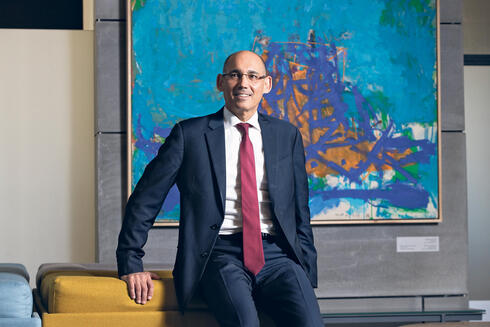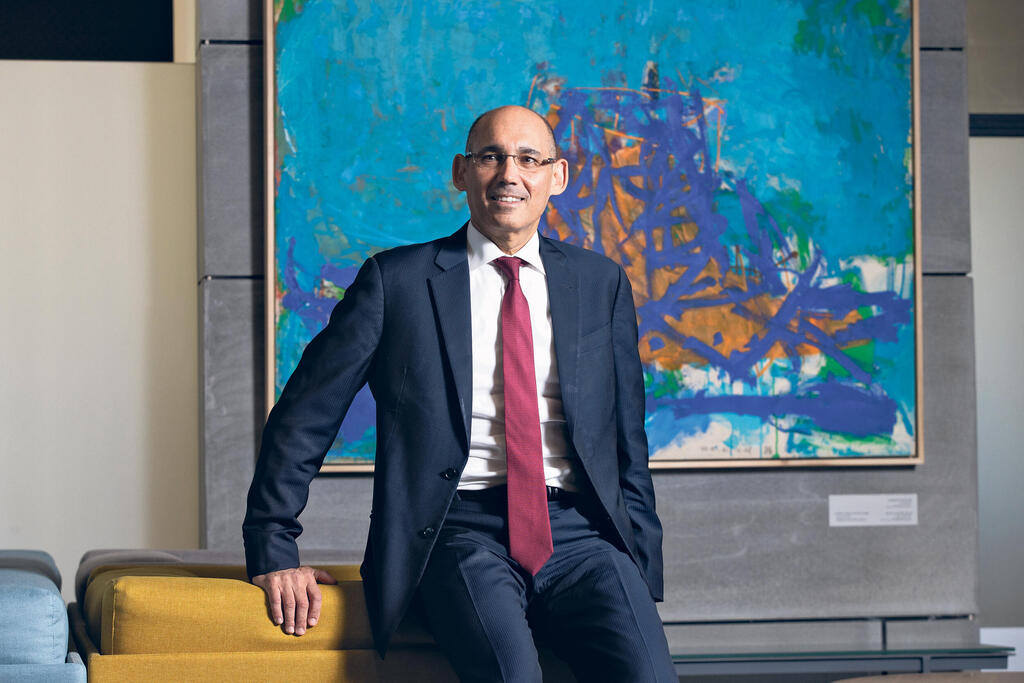
Interview
Bank of Israel Governor: “Current interest rate can contain inflation”
In an exclusive interview, the Governor of the BOI, Amir Yaron, clarifies the need for the interest rate to jump and explains why he’s convinced that Israel will overcome even an extreme economic scenario
The two consecutive drastic interest rate hikes, taken in an attempt to return inflation to the target range, put the main player in the arena, the Bank of Israel, in the spotlight. In an interview with Calcalist, Bank Governor Prof. Amir Yaron explained the motivation for the determined moves, which he recently explained through the concept of Front Loading. He also discussed the effect of the interest rates on the housing market and what can be done so politicians don't use interest levels as a tool to attack rivals.
The interest rate hikes are a tough pill to swallow for the public.
"We understand the pain of raising interest rates, but inflation needs to be curbed. I have said several times: it hurts today to avoid greater pain in the future. The acceleration of raising the interest rate should prevent the need for interest rate increases higher than the level of 3% and more, which we think is necessary. In our estimation, the current interest rate is already within the range that can contain inflation."
If you had started acting earlier, would we be in a different situation today?
"Already in May 2021, we said that this expansion should be stopped. I can't tell you in retrospect that we knew we would see inflation of such magnitudes, but we definitely thought that these special tools should be dropped gradually, and we stopped the loans to the banks and the purchase of bonds. We did it before the Fed, and long before the European Central Bank (ECB). Even if we had acted earlier, we would not have seen very big differences in the final result compared to the situation we are in now. After all, even if we had raised it then, we would not have raised it aggressively because then there was no reason. Perhaps an early increase would have allowed for a little more gradualness, but it would not have changed the general picture. Relative to the world and our level of inflation, we acted decisively and quickly."
Countries like Chile, Hungary and Poland started the uploading process earlier.
"These countries can be thought of in two ways. On the one hand, they are developing economies, and they may have taken a good defensive step on the exchange rate. On the other hand, precisely because they moved very much ahead of the Fed and the ECB, the effectiveness of each percentage increase may have been low. They are at interest rates of 7-9% with deep inflation. That's why I say it's important to look at the timing in a broad context as well."
The chairman of Bank Leumi stated that "inflation will go down regardless of the Bank of Israel." Perhaps Israel, as an open economy, can be satisfied with the Fed's measures?
"Obviously, we are an open economy, so at the beginning of the process I said that we see that most of the increase in inflation is in tradable items. But now we see that inflation is in a wide range of items, and over time. We see that it comes from the demand side, much more than what comes from abroad. If we deduct energy, we are already approaching inflation in the world. We were presented with a slide that shows that 75% of the index items have become more expensive by more than 3%, and with all due respect, the issue should be looked at in a much broader perspective. There is a difference between the way inflation is handled now, and the way inflation is handled at the beginning."
The rise in interest rates may lead to a cooling of the housing market, it has already led to moderation in new mortgages.
"Interest is a horizontal tool, it is not intended to address the housing market directly, but in general to contribute to inflationary restraint. If interest rates rise, mortgages also rise, so even if there is some moderation in prices, young couples and all those who need to enter the housing market will not find themselves in a much more comfortable environment. Therefore, the solution is only on the supply side. Many changes need to be made throughout the entire housing system, from planning, to manpower in the planning committees, and finally, the part that is probably the most difficult, is the incentives at the level of the local authorities."
You said about the housing market that "increases of 18% a year are a problem for the economy and society in Israel", so why do you vehemently oppose all the calls to impose more restrictions on mortgages, thereby cooling demand?
"We have a lot of demand. A lot of this demand is welcome, because of a very healthy demographic. We conducted an analysis at the Bank of Israel that talks about the fact that the part of interest contributes about a fifth to price increases. That's why I focus on the supply side because as we find ways to increase it, it will reduce the pain. It should be understood that underwriting in Israel is one of the strictest in the world, both in terms of monthly payment to income and in terms of the ratio of financing to the value of the property. If we tighten the restrictions, who exactly are we excluding from the market? If we were to put more and more restrictions, we would reach a situation where only the really wealthy would be able to buy in the housing market.”
The public's mortgage portfolio shows a certain increase in the level of risk.
"It is true that at the individual level there was a certain increase in the rate of mortgages where the repayment rate compared to the salary is high, but even there there is a decrease. The failure rates in Israel are very low, we see that the public in Israel is paying back mortgages. The system has safety measures at the individual level as well, but regarding the system, it is important to emphasize that it is very stable."
At what level of falling housing prices is there a risk to the financial system?
"I won't go into a specific number, but I will say that even in very large extreme scenarios we do not see a systemic problem. We and the Supervisor of Banks do stress tests that include not only falling prices, but serious scenarios of falling prices with a combination of a very significant increase in unemployment, which is the real parameter where we meet 'inability to repay'. We have a very large capacity in terms of stability and we are constantly checking it."
In 2019, the Committee for Financial Stability was established, and today there is instability and many concerns. What is going on in this secret committee?
"In light of the volatility, there is no doubt that there are more financial stability risks in the world, certainly after what happened in Britain. We also follow the events at Credit Suisse, and constantly monitor and follow the markets, also at the institutional level. I will not specify when the committee meets, but I can say that there is a dialogue between me and officials in the bank and outside the bank. The committee also meets, but we also work without the committee."
The interest rate increases have become a tool for political confrontation. Opposition leader Netanyahu blamed Prime Minister Lapid and Finance Minister Lieberman for the rise in mortgage prices. Maybe that's good for you, it takes the fire off of you?
"I am not entering this topic. This is my fifth election campaign as governor, and I’m on my third prime minister and third minister of finance, this may be a record. We only look at the good of the economy. We see inflation as a global phenomenon, and inflation in Israel is lower than the rest of the world. The Israeli economy is robust and dynamic and has passed all crises in a nice way, growing nicely and with a tight labor market. All of these things allow us, among other things, to take the steps we have taken. We make decisions in a professional manner, the independence of the Bank of Israel and the independence of the governor are fundamental values. We have made this clear at all kinds of events, and especially in everything which is related to monetary policy. Interest rate decisions are made by the committee, with a purely professional focus."
Are you afraid that the political criticism of the interest rate increases will lead to damage to the independence of the central bank?
"I don't think there will be any political party that would dare to touch the independence of the Bank. It is enough to look at countries where they tried to do such things and see what it did to their economy, their currency and their status in the world. Everyone is clear about the importance of the independence of the Bank of Israel, independence was there all along, and so it will continue."
Since the members of the monetary committee were replaced, decisions have been made unanimously. How is it that there is an overwhelming agreement?
"This does not mean that there isn't a variety of opinions in the room, there is a very pointed discussion throughout, and you only see the edge of the process. It is a process that begins long before the formal discussions, there is a mixture of positions and opinions. I am not saying that there will always be a unanimous position, there is no such directive. Following a very in-depth discussion, and after the members of the committee are challenged here and there, they finally come to the opinion that this is the right decision. But we'll see what happens in the future."
You talk a lot about the political instability as a problem for the economy, but it seems that Israel survives economic crises very well, and even now the fact that there is a transitional government prevents it from taking steps that could, for example, harm the fight against inflation, as happened for example in Great Britain.
"We have the dynamism and strength to go through crises, and Israel really came through the last crises well. But I see challenges in everything related to infrastructural reforms. I'm talking at all levels, in real estate, in education, in transportation, in connecting more populations to the speeding locomotive of high-tech. These things require multi-year planning and long-term vision and consistent conduct over time. All this is difficult to do when the system is unstable, and this is the great price of the instability. There is great uncertainty as to how this will affect the medium and long term, and we want to see the country continue to grow rapidly."















